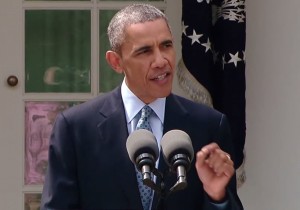
Iranian President Hassan Rouhani told his nation and the world on Friday that his country will honor its pledges in the historic agreement on Iran’s nuclear ambitions as long as the other participants in the deal honor theirs.
Calling today a “day that will remain in the historical memory of the Iranian nation,” Rouhani told Iran via television that the deal made in Lausanne, Switzerland will aknowledge Iran’s right to enrich uranium on its own territory for peaceful purposes. He told his nation, “Some think that we must either fight the world or surrender to world powers. We say it is neither of those,” he said. “There is a third way: We can have cooperation with the world.”
Upon news of the agreement, cheers erupted throughout Tehran and Iranians took to the streets waving flags and cheering.
In the U.S. President Obama said from the White House that the deal is historic and called the agreement a good deal that met the core objectives of the talks. “Iran will face strict limitations on its program, and Iran has also agreed to the most robust and intrusive inspections and transparency regime ever negotiated for any nuclear program in history,” he said.
Obama said on Thursday, that many key details still need to be finalized and said, “nothing is agreed to until everything is agreed.” Obama also pointed out that “if Iran violates the deal, sanctions can be snapped back into place.”
Iran, under the agreement will see relief from international sanctions in return for cutting back on its uranium enrichment program by reducing the number of uranium enrichment centrifuges to 6,104 from its current number of 19,000. Of the 6,104, only 5,060 of those centrifuges will enrich uranium for the next 10 years.
The agreement also stipulates that the Fordo underground nuclear facility in Iran must be converted to disallow and uranium enrichment and the Arak reactor must be re-designed to prevent the production of weapons grade plutonium used in nuclear weapons.
On Thursday, President Obama called Israel’s Prime Minister Benjamin Netanyahu to discuss the deal. Obama told the Prime Minister, “the framework represents significant progress towards a lasting, comprehensive solution that cuts off all of Iran’s pathways to a bomb and verifiably ensures the peaceful nature of Iran’s nuclear program going forward.”
Netanyahu told Obama that “a deal based on this framework would threaten the survival of Israel,” according to the Prime Minster’s spokesman. In a tweet, the leader said, “The concessions offered to Iran in Lausanne would ensure a bad deal that would endanger Israel, the Middle East and the peace of the world.
Democratic Presidential hopeful Hillary Clinton praised the agreement, but also said, “The onus is on Iran and the bar must be set high.”
Alaska’s Senator Murkowski responded to the news with a statement, saying, “Regardless of whether this proves to be a good deal or a bad one, today’s agreement must be presented to Congress for consideration. My support for Senator Corker’s bipartisan legislation that requires the President do just that before relieving sanctions remains rock solid. The President must acknowledge Congress’ legitimate role in this process and resist the urge to move out unilaterally, as he has tended to do on other issues in recent months.”
This framework agreement is scheduled to be finalized by June 30th.
